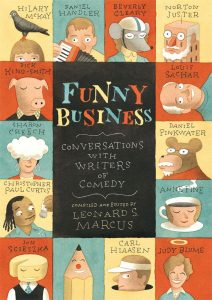Funny Business: Conversations with Writers of Comedy
 Funny Business: Conversations with Writers of Comedy compiled and edited by Leonard S. Marcus, Candlewick Press, 2009. 224 pp.
Funny Business: Conversations with Writers of Comedy compiled and edited by Leonard S. Marcus, Candlewick Press, 2009. 224 pp.
With all his previous work on the history and craft of children’s books, it could seem that humor is a rather frivolous subject for author Leonard Marcus. A study of comic writing might also reveal that the dissected laugh always dies. Yet, within the 14 interviews that comprise Funny Business: Conversations with Writers of Comedy, Marcus reveals variations on a theme of wit that are sure to startle and amaze the reader.
Some interview subjects are obvious. How could you do a book about humor in kids’ books without those masters of silliness, Jon Scieszka or Daniel Pinkwater? Impossible. Yet, he also includes authors whose humor might seem to live in the background, occasionally leaping out to give a situation or character perspective. Under Marcus’ skillful questioning, however, it becomes clear that those laughs breathe life into a story, such as when Christopher Paul Curtis’ Bud talks about how six is a bad time” because you start to lose your teeth and “you’ve got to wonder what’s coming off next, your arm?”
Sharon Creech confides that she is drawn to humor that arises out of sorrow or fear.” Judy Blume seems to share this approach as she tells Marcus of initial reactions to Blubber. At first, the book is greeted by hysterical laughter and “then, all of a sudden, it was wham! They got it, and there was dead silence, because they all realized that any one of them could be in this position or could do those awful things.”
One cannot talk about awful things without referring to the interview with Daniel Handler, aka Lemony Snicket. Marcus provides a window into the creative process that is sure to fascinate “Unfortunate Events” fans by including an email interchange between Handler and his editor Susan Rich on their quest to find just the right metaphor for the dire confusion of the Baudelaires. Frantic snakes? Sinking ships? The possibilities are both numerous and wickedly witty.
While Funny Business will be relished by teachers and librarians who love children’s books and help steer students to books that will engage them, another important audience is made up of the young readers themselves. So you can’t have Norton Juster visit your school to discuss The Phantom Tollbooth? Thanks to Leonard Marcus, you can eavesdrop on a conversation and learn about how the Triple Demons of Compromise flummoxed Juster’s friend and illustrator Jules Feiffer or another of the countless inside stories that make these gifted authors real. In Funny Business, Marcus doesn’t dissect the humor – he illumines it.
– Reviewed by Ellen Myrick
